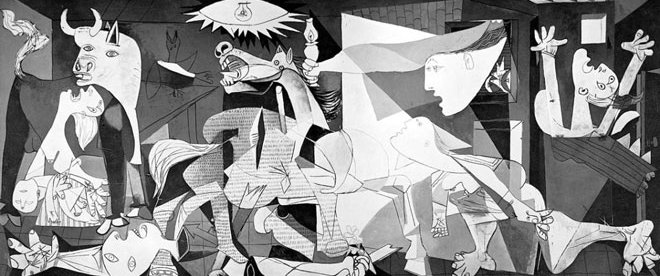- DURATION 4 x 60 mins
Event Description
About the series - Political Art: Fighting for Change
What impact can an artist really have on the politics of the day? What do artists Jacques-Louis David and Banksy have in common? The grand history paintings by the former hang proudly in the Louvre, whereas the latter defiantly hung his own canvas in the same museum in 2004 as a publicity stunt (without the approval of the institution). One was known as the official painter of the French Revolution and the other is certainly triggering his own street revolution through his rebellious graffiti art.
Rising out from a deep-rooted connection between art and politics, we will explore a diverse range of post-war and contemporary artists, all of whom have attracted attention due to their ability to hold a mirror up to society.
Session 1: Art & Politics: Exploring Context (April 21st)
As an introduction to our series, this talk will span the 18th century through to today to look at how politics and art have developed hand in hand. Simple commentators or vigorous activists, the artists we will look at have defied convention to throw tough topics into the light. Our particular focus for this talk is the aftermath of World War II. How is it some contemporary artists still find themselves working in a 'post-war' era decades after 1945? This thought-provoking, challenging talk provides an insight into the works by some of the greatest artists of the 20th century, including Pablo Picasso and Georg Baselitz.
Session 2: Art as Socio-Political commentary (May 19th)
“An artist must also be an activist aesthetically, morally, or philosophically.” Ai Weiwei
Should art be used as a spring-board for political discussions? Are there certain themes that are off-limit to artists? In this session we will focus on contemporary artists that have actively chosen to engage with politics, sometimes even at the cost of risking their lives to do so. From Ai Weiwei's colossal public political statements to Banksy's provocative painting of Parliament overrun with chimpanzees, it seems that no subject is out of bounds. Why then did crowds of people appear at the Whitney Biennial demanding the removal, and even the destruction, of a painting by Dana Schutz?
With its broad definition of the socio-political, this talk will encompass ideas surrounding national identity, immigration, commoditization and freedom of speech.
Session 3: Art vs Media (June 23rd)
In this session we will focus on post-war and contemporary artists who challenge media imagery in an attempt to re-educate their audience in looking once more.
Starting with a comparison between British and American Pop artists, we will explore how artists perceived the boom of film, advertising and TV after the 1960s. When did the media-saturated world we live in today grow its foundations? How did artists then and now expose the unreliability of images and warn us of their power to mislead?
Creating a dialogue between Gerhard Richter’s 1960s photo paintings and Luc Tuymans’ recent realistic compositions, we will see how the mistrust of imagery has remained an important concern for artists since the second half of the 20th century.
Growing up as part of the Television Generation Luc Tuymans was fascinated by the flashing images that bombarded his everyday. While doing so, Tuymans exposed the unreliability of pictures, their manipulation and their potent ability to promote an agenda or message. Paintings have a different time-span to magazine images, and the length of time people stand in front of a painting is drastically different to how long they would analyse an image in a newspaper. In this session we will focus on post-war and contemporary artists who challenge the images shared by the media and attempt to re-educate their audience to learn how to look once more.
Session 4: Gender Politics: Feminism in Art (July 5th)
Artist Suzanne Lacy declared, the goal of Feminist art was to "influence cultural attitudes and transform stereotypes." Beginning in the 1960s, its initial aim was to create opportunities and spaces that previously did not exist for women and minority artists. Using a variety of mediums, Feminist art challenged the dominance of men in both art and society, in order to support equality for women artists, and to question assumptions about womanhood. As many of these issues are still ongoing today, a younger generation of feminist artists are now using their art to bridge these concerns with those of race, class, forms of privilege, and gender identity, all of which we’ll explore in this session.
- Duration: 4 x 60 mins
- Online Zoom event: Join from your computer, phone or tablet (no replay available)
Upon completing her Masters in Curating at The Courtauld Institute of Art, Bojana worked at TATE Britain and The Serpentine Galleries before seeking experience in the private art sector. For a few years she worked for private art galleries in Zurich and Paris before moving to the leading auction house, Christie’s, in London. During her four years at Christie’s she worked as a Specialist in the Post-War and Contemporary Art department where she also led art history lectures in collaboration with Christie’s Education’s MA programme. Since then, Bojana has been working as a freelance art consultant, Art History lecturer and writer.
LinkedIn: https://www.linkedin.com/in/bojana-popovic-a5842642/
Presented in collaboration with LEVEL
LEVEL is an online platform offering online talks and discussions to expand our cultural awareness. We invite extraordinary speakers, thinkers, researchers and authors to share their views and ideas with our community of open-minded and curious individuals.
Preparing for the Event
For the best experience, you will need to have Zoom downloaded onto your computer. Please ensure you're connected to broadband/wifi rather than using your mobile phone connection (3G/4G).
We also recommend that pets are either calmly sitting on your lap or in another room, and any refreshments you may require are within your reach!
More Information
What if I can’t make the event?
If a recording’s available for the event, you can still register for it and we will send you an email with a link to a recording shortly after it ends.
Will my camera be on and will I be visible to the other people?
Your camera and microphone does not need to be on for you to enjoy the event. The choice about whether to do this is completely yours.
How do I watch the live event?
Rest Less events are hosted on Zoom, a computer application that allows you to attend online events just by clicking a link. For detailed instructions, please go to our "FAQ" page, which you can find a link to in the nav bar at the top of the page.
How do I sign-up for and access the recording? (Recorded events only)
Book the event as normal (as if you are attending live). After the event ends you will automatically receive a post-event email with a link to the recording, as long as the event was recorded. You do not need to do anything else and there is no separate booking process for recordings only. Please note it can take up to 24 hours for Zoom to process recordings.

